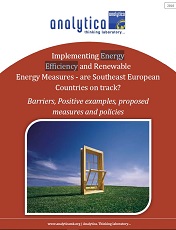Implementing Energy Efficiency and Renewable Energy Measures – are Southeast European Countries on track? Barriers, Positive Examples, Proposed Measures and Policies
Implementing Energy Efficiency and Renewable Energy Measures – are Southeast European Countries on track? Barriers, Positive Examples, Proposed Measures and Policies
Author(s): Sonja Risteska, Nataša Hroneska
Subject(s): Energy and Environmental Studies, Governance, Environmental and Energy policy, Economic development, EU-Approach / EU-Accession / EU-Development, EU-Legislation
Published by: Аналитика Тинк-тенк Организација
Keywords: North Macedonia; EU integration; EU regulations; energy; energy policy; energy sector; energy efficiency; renewable energy; Energy Law; Energy Community; energy efficiency measures;
Summary/Abstract: Energy efficiency (EE) is a vital part of every country’s energy policy. All countries strive to establish an energy system that will enable balanced development of environmental protection, the competitiveness of the market and the security of energy supply. But the uncertain global energy market and the poor use of indigenous energy resources make it difficult to build a sustainable energy system in Macedonia. Remaining highly dependent on energy, without proper implementation of energy efficiency, the overall success of energy development is at stake. Macedonia as a country member of the Energy Community and a candidate for EU membership needs to keep up the pace with the other countries of South Eastern Europe when it comes to reforms of the energy sector. However, implementation of reforms is one of the main problems in Macedonia. According to a study conducted by Analytica in February, Macedonia is seriously lagging behind in the implementation of reforms in the energy sector, including the implementation of energy efficiency measures at the national and local levels.
Series: ANALYTICA - Thinking Laboratory
- Page Count: 19
- Publication Year: 2010
- Language: English
- Content File-PDF

